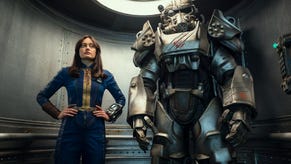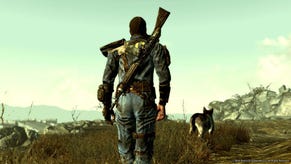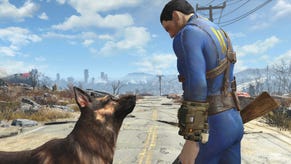Natural Born Killer
Part 1: An experiment in genocide, using Fallout 3.
Gob hits me. Not literally, of course - he's much too kindhearted for that. But as he runs away, clutching his bleeding head and begging for mercy, I am genuinely struck by a deep, genuine remorse. Here's a Ghoul - not an undead monster in the traditional sense, but one of the residents of the Capital Wasteland whose appearance was deeply disfigured by radiation - who has spent his long, painful life beleaguered by intolerance and various physical ailments. He spends his days mixing drinks at a sleazy bar in Megaton, constantly harassed and mocked for his condition by his boss, Colin Moriarty. And now I've strolled in, dismembered all his friends and coworkers, and am chasing him through the dingy building while he tries - in vain, naturlich - to hide. Gob won't be the last person I mercilessly slaughter in Megaton this day, but his death will stay with me the longest.
Which may seem surprising, as I've already ploughed through old ladies, overworked doctors, and starving beggars with my trusty sledgehammer. (Well, it became my trusty sledgehammer after I clubbed one of Megaton's sledgehammer-wielding citizens to death with a baseball bat.) I'm on a mission - not to praise Jesus or ensure that every child in Namibia has a netbook, but to kill every single living vaguely human-like character in Fallout 3. Kids are off the menu because a) Fallout 3 doesn't let you kill them, and b) I couldn't do it, anyway. But everyone else, no matter how friendly, helpful, or beneficial to my completion of the game, must be put into the ground.
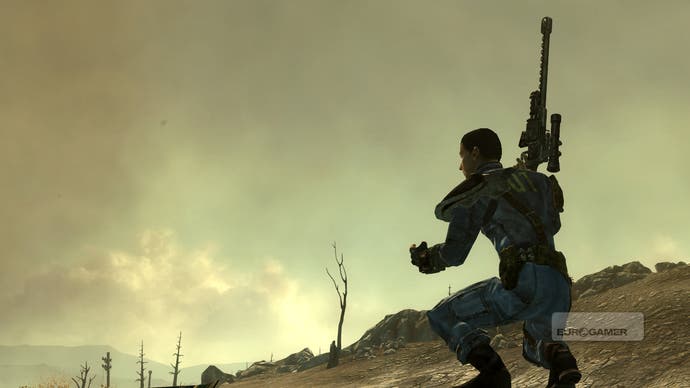
I'm doing this because I want to test the simu-limits of Bethesda's most accomplished softwork. Oblivion left me cold, but I adored Fallout 3 on release, and will quite happily place it on a pedestal next to Interplay's first two instalments in the series. The first time I ran through it, though, I, like most other people, played a hero. I did get to watch Megaton explode, but only because I'd quicksaved just beforehand, and could easily go back and Do The Right Thing. Which, of course, I promptly did. (Videogames 1, Real Life 0.)
The deliciousness of a great open-worlder is not so much in going back and doing it all again differently - because, really, who has the time? - but in knowing that you could, if you wanted. If the game doesn't trigger that sensation at every step, it's a waste of time and money. Thankfully, Fallout 3, like its canonical predecessors, delivered - I was always acutely aware of at least a dozen little ghosts running around my pure-hearted self, doing the whole thing with a more avaricious, hedonistic, or just downright evil bent. Blow up Megaton, turn in the android, request "protection money": I saw it all happen in my mind's eye. A bit like Sliding Doors, but with Super Mutants and exploding craniums.
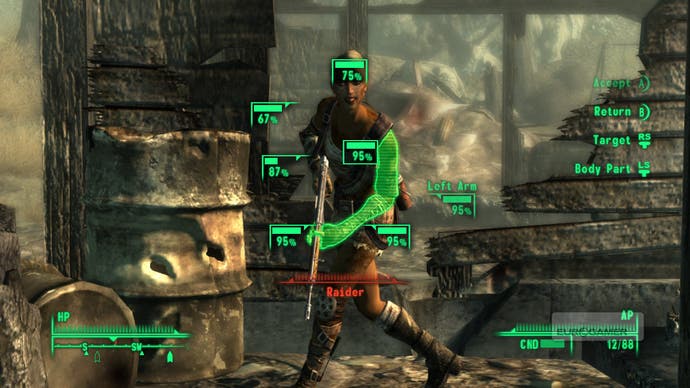
But this is something else entirely. This isn't even mass-murder. This ain't rock 'n' roll. This is genocide.
Before we go on, I should clarify that my mission has another, slightly more snooty, objective: anti-videogames pundits love to describe games like this as "mass-killing simulators", and whilst I'm reasonably confident that the vast majority of Fallout 3's buyers (and rascally downloaders) wouldn't dream of playing it that way, I want to know if there's any merit to the practice. Is it any fun? Will I feel like I've been missing out on something? Or perhaps Dale Dye's and Eliot Spitzer's doomiest predictions might come to pass: will I end up chasing my wife around the house with the business end of an umbrella? Time will tell.

